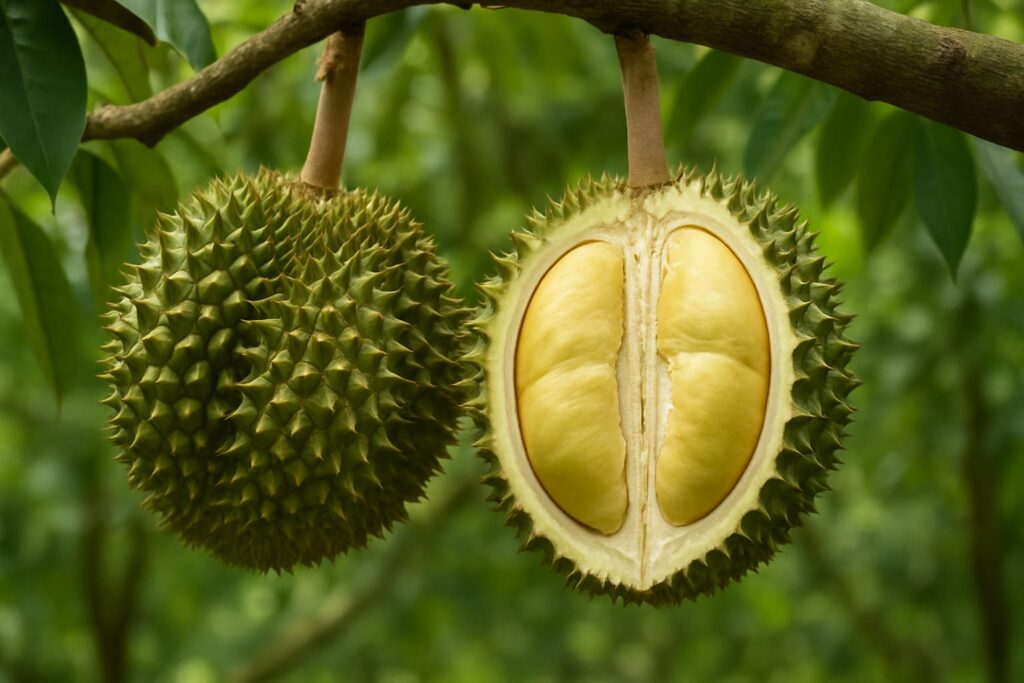Durian Benefits and Nutritional Information: The Complete Guide
Durian, often referred to as the “king of fruits,” is a tropical delicacy celebrated for its unique aroma, creamy texture, and rich nutritional profile. For centuries, people in Southeast Asia have considered durian not only a flavorful fruit but also a natural source of health-promoting compounds. In this article, we will explore durian benefits and nutritional information, shedding light on why this exotic fruit is gaining attention worldwide.

Durian Benefits and Nutritional Information for Overall Health
The first reason durian is so highly valued is its impressive nutrient content. Unlike many tropical fruits that are primarily water and sugar, durian offers a dense concentration of vitamins, minerals, and antioxidants. Therefore, consuming it in moderation can contribute positively to overall health.
In addition, durian contains essential macronutrients that provide long-lasting energy. For instance, its healthy fats and dietary fiber support digestion and satiety, making it more than just a sweet treat.
The Nutritional Value of Durian Explained
One of the most notable characteristics of durian is its high energy content. A 100-gram serving provides approximately 147 calories, mainly from carbohydrates and natural sugars. This makes it an excellent option for those needing a quick energy boost.
Moreover, the fruit’s combination of carbohydrates and fiber ensures that blood sugar levels rise gradually rather than spiking suddenly. This property is particularly beneficial for maintaining stable energy throughout the day.
Durian Benefits and Nutritional Information for Digestive Wellness
Durian is a rich source of dietary fiber, which plays a crucial role in maintaining a healthy digestive system. Fiber supports bowel regularity, prevents constipation, and contributes to a balanced gut microbiome.
Furthermore, the fiber in durian can help reduce cholesterol absorption, promoting cardiovascular health. When combined with its antioxidant content, durian becomes a supportive food for digestive and heart wellness.
Durian Benefits and Nutritional Information: A Strong Antioxidant Profile
Another remarkable aspect of durian is its abundance of antioxidants. These compounds protect the body against oxidative stress, which can damage cells and accelerate aging.
For example, durian is rich in vitamin C, anthocyanins, and flavonoids, all of which help neutralize free radicals. Therefore, incorporating durian into a balanced diet may reduce the risk of chronic diseases linked to oxidative damage, such as heart disease and certain cancers.
Boosting Immunity with Durian
The immune-boosting properties of durian are largely attributed to its vitamin C content. Just one serving provides over 30% of the daily recommended intake of this vital nutrient.
As a result, eating durian can strengthen the immune system, support collagen production, and enhance the body’s ability to heal wounds. In addition, vitamin C works synergistically with other antioxidants present in durian, offering comprehensive immune defense.
Durian Benefits and Nutritional Information: A Natural Mood Enhancer
Durian contains tryptophan, an amino acid that plays a key role in the production of serotonin. Serotonin is often called the “feel-good hormone” because it regulates mood, sleep, and appetite.
Therefore, consuming durian in moderation may contribute to improved mood and better sleep quality. Moreover, the fruit’s natural sugars provide an immediate sense of energy and well-being, making it a comfort food for many.
Protecting the Heart with Durian Benefits and Nutritional Information
Heart health is one of the most important areas where durian can make a difference. Its potassium content helps regulate blood pressure, while its dietary fiber assists in lowering cholesterol levels.
In addition, the healthy fats in durian support cardiovascular function without the risks associated with trans fats or heavily processed oils. When consumed responsibly, durian can become a valuable ally in protecting the heart.
Durian Benefits and Nutritional Information: Essential Vitamins and Minerals
Durian offers a wide variety of micronutrients essential for daily health. These include:
- Vitamin B complex: Supports energy metabolism and brain function.
- Vitamin C: Strengthens immunity and skin health.
- Potassium: Regulates blood pressure and fluid balance.
- Magnesium: Important for muscle and nerve function.
- Copper and iron: Support red blood cell formation and oxygen transport.
This impressive profile explains why durian is often considered more nutritious than many other tropical fruits.
Skin Health Advantages of Durian
Skin health is another area positively influenced by durian consumption. Its vitamin C and antioxidant content protect against premature aging caused by free radicals.
Furthermore, durian’s natural compounds may support collagen synthesis, improving skin elasticity and reducing fine lines. For people seeking a natural approach to skincare, incorporating durian occasionally can be a beneficial choice.
Durian Benefits and Nutritional Information: Potential Drawbacks
Although durian offers numerous health advantages, it should be consumed in moderation. Due to its high calorie and carbohydrate content, excessive intake may contribute to weight gain.
In addition, individuals with diabetes should monitor portion sizes carefully, as durian is rich in natural sugars. However, when eaten responsibly, its health benefits outweigh potential drawbacks.
Durian in Traditional Medicine
Historically, durian has been used in traditional medicine across Southeast Asia. It was believed to reduce fever, improve fertility, and even act as an aphrodisiac.
While scientific research on these claims is still limited, the fruit’s nutritional composition provides a strong foundation for its role in natural remedies. Therefore, its cultural significance adds another dimension to its reputation as the “king of fruits.”
Durian Benefits and Nutritional Information: How to Incorporate It in Your Diet
Adding durian to your diet can be enjoyable and creative. Here are some ideas:
- Eat fresh durian pulp as a snack or dessert.
- Blend it into smoothies for a creamy texture.
- Use it in baking, such as cakes or pastries.
- Mix it into ice cream or yogurt for a tropical twist.
However, it is important to balance durian with lighter fruits and vegetables to avoid excessive calorie intake.
Comparing Durian with Other Tropical Fruits
Compared to bananas, mangos, or papayas, durian stands out for its higher fat and protein content. These macronutrients make it more filling and energy-dense.
Moreover, its unique amino acid profile, particularly tryptophan, gives it advantages that other tropical fruits lack. Therefore, durian deserves a place in a diverse and health-focused diet.
Frequently Asked Questions about Durian Benefits and Nutritional Information
Is durian good for weight loss?
Durian can support weight management when eaten in moderation because its fiber promotes satiety. However, its calorie density means portion control is essential.
Can people with diabetes eat durian?
Yes, but in small amounts. The natural sugars in durian can raise blood sugar, so diabetic individuals should monitor their intake.
Why is durian called the king of fruits?
Its rich taste, distinctive aroma, and impressive nutritional value have earned it this title in many Asian cultures.
Is it safe to mix durian with alcohol?
Traditionally, it is advised not to consume durian with alcohol, as the combination may cause discomfort and indigestion.
How often can I eat durian?
Once or twice a week in moderate portions is generally considered safe for healthy individuals.
Final Thoughts on Durian Benefits and Nutritional Information
Durian is a fruit that goes far beyond its strong aroma and polarizing taste. Rich in energy, fiber, antioxidants, and essential nutrients, it offers multiple health advantages ranging from improved digestion to stronger immunity and heart protection.
However, as with any energy-dense food, moderation is key. By including durian responsibly in your diet, you can enjoy not only its unique flavor but also its remarkable contributions to well-being.
